vector_map 0.7.0  vector_map: ^0.7.0 copied to clipboard
vector_map: ^0.7.0 copied to clipboard
Vector map for Flutter. Highly customizable. Compatible with GeoJSON. Map chart. Pure Flutter.
Vector Map #
- Compatible with GeoJSON
- Multi resolution with geometry simplification
- Highly customizable
- High performance
- Interactable
- Pure Flutter (no WebView/JavaScript)
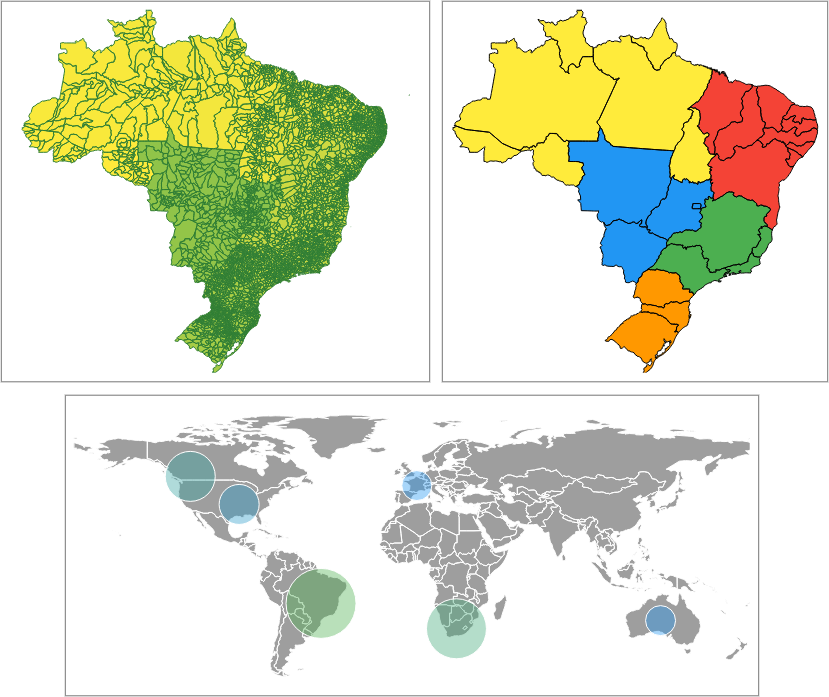
Usage #
- About the examples
- Reading GeoJSON from String
- Reading GeoJSON properties
- Creating the Widget
- Theme
- Highlight theme
- Contour thickness
- Cursor hover
- Layers
- Marker
- Addons
- Click listener
- Mode
- Debugger
- Support this project
About the examples #
Simplified GeoJSONs will be used in the examples to demonstrate package usage. The following examples will assume that GeoJSONs have already been loaded into Strings. The full code is at https://github.com/caduandrade/vector_map_flutter_demo.
polygons.json (link)
| Name | Seq | Rnd | Gts |
|---|---|---|---|
| "Einstein" | 1 | "73" | 15000 |
| "Newton" | 2 | "92" | 7500 |
| "Galileu" | 3 | "10" | 3000 |
| "Darwin" | 4 | 15000 | |
| "Pasteur" | 5 | "77" | 17000 |
| "Faraday" | 6 | "32" | 17500 |
| "Arquimedes" | 7 | "87" | 25000 |
| "Tesla" | 8 | "17" | 12500 |
| "Lavoisier" | 9 | 4000 | |
| "Kepler" | 10 | "32" | 18000 |
| "Turing" | 11 | "93" | 31400 |
points.json (link)
| Name | AN |
|---|---|
| "Titanium" | 22 |
| "Niobium" | 41 |
| "Carbon" | 6 |
| "Neon" | 10 |
| "Silicon" | 14 |
| "Hydrogen" | 1 |
Reading GeoJSON from String #
Reading the geometries only.
MapDataSource polygons = await MapDataSource.geoJson(geoJson: geoJson);
Reading GeoJSON properties #
The keys argument defines which properties must be loaded.
The parseToNumber argument defines which properties will have numeric values in quotes parsed to numbers.
The labelKey defines which property will be used to display its values as feature labels.
MapDataSource polygons = await MapDataSource.geoJson(
geoJson: geoJson,
keys: ['Seq', 'Rnd'],
parseToNumber: ['Rnd'],
labelKey: 'Rnd');
Creating the Widget #
VectorMapController _controller = VectorMapController();
MapDataSource polygons = await MapDataSource.geoJson(geoJson: geoJson);
MapLayer layer = MapLayer(dataSource: polygons);
_controller.addLayer(layer);
VectorMap map = VectorMap(controller: _controller);
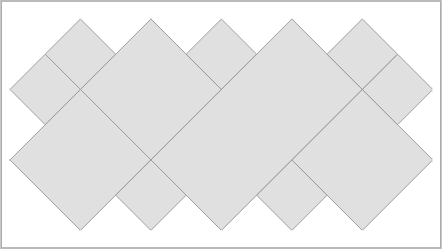
Theme #
MapLayer layer = MapLayer(
dataSource: polygons,
theme: MapTheme(color: Colors.yellow, contourColor: Colors.red));
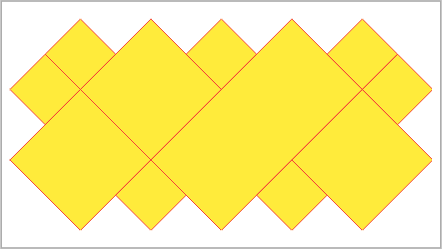
Label visibility #
MapDataSource polygons =
await MapDataSource.geoJson(geoJson: geoJson, labelKey: 'Name');
MapLayer layer = MapLayer(
dataSource: polygons,
theme: MapTheme(labelVisibility: (feature) => true));
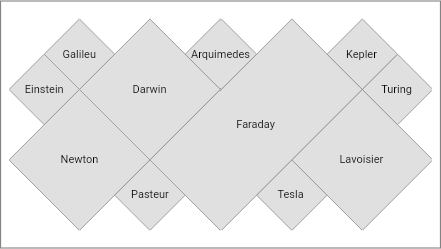
MapLayer layer = MapLayer(
dataSource: polygons,
theme: MapTheme(labelVisibility: (feature) => feature.label == 'Darwin'));
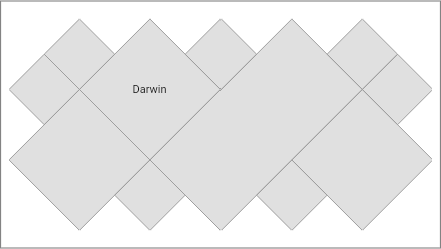
Label style #
MapLayer layer = MapLayer(
dataSource: polygons,
theme: MapTheme(
labelVisibility: (feature) => true,
labelStyleBuilder: (feature, featureColor, labelColor) {
if (feature.label == 'Darwin') {
return TextStyle(
color: labelColor,
fontWeight: FontWeight.bold,
fontSize: 11,
);
}
return TextStyle(
color: labelColor,
fontSize: 11,
);
}));
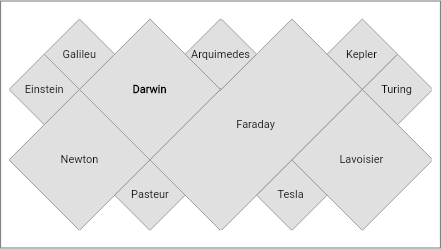
Color by property value #
Sets a color for each property value in GeoJSON. If a color is not set, the default color is used.
Mapping the property key:
MapDataSource polygons = await MapDataSource.geoJson(
geoJson: geoJson, keys: ['Seq'], labelKey: 'Seq');
Setting the colors for the property values:
MapLayer layer = MapLayer(
dataSource: polygons,
theme: MapValueTheme(
contourColor: Colors.white,
labelVisibility: (feature) => true,
key: 'Seq',
colors: {
2: Colors.green,
4: Colors.red,
6: Colors.orange,
8: Colors.blue
}));
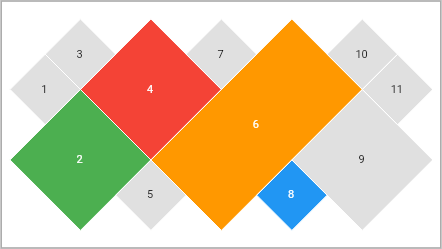
Color by rule #
The feature color is obtained from the first rule that returns a non-null color. If all rules return a null color, the default color is used.
Mapping the property key:
MapDataSource polygons =
await MapDataSource.geoJson(geoJson: geoJson, keys: ['Name', 'Seq']);
Setting the rules:
MapLayer layer = MapLayer(
dataSource: polygons,
theme: MapRuleTheme(contourColor: Colors.white, colorRules: [
(feature) {
String? value = feature.getValue('Name');
return value == 'Faraday' ? Colors.red : null;
},
(feature) {
double? value = feature.getDoubleValue('Seq');
return value != null && value < 3 ? Colors.green : null;
},
(feature) {
double? value = feature.getDoubleValue('Seq');
return value != null && value > 9 ? Colors.blue : null;
}
]));
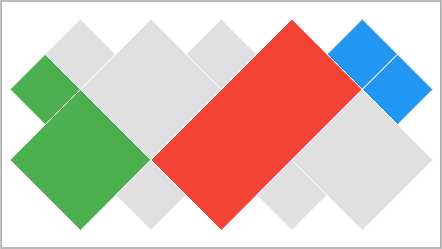
Gradient #
The gradient is created given the colors and limit values of the chosen property. The property must have numeric values.
Auto min/max values
Uses the min and max values read from data source.
MapDataSource polygons = await MapDataSource.geoJson(
geoJson: geoJson, keys: ['Seq'], labelKey: 'Seq');
MapLayer layer = MapLayer(
dataSource: polygons,
theme: MapGradientTheme(
contourColor: Colors.white,
labelVisibility: (feature) => true,
key: 'Seq',
colors: [Colors.blue, Colors.yellow, Colors.red]));
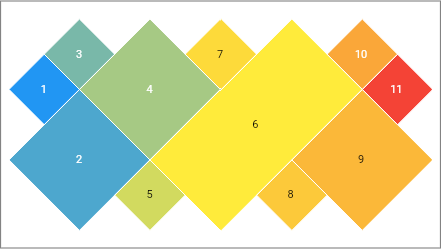
Setting min or max values manually
If the min value is set, all lower values will be displayed using the first gradient color.
If the max value is set, all higher values will be displayed using the last gradient color.
MapDataSource polygons = await MapDataSource.geoJson(
geoJson: geoJson, keys: ['Seq'], labelKey: 'Seq');
MapLayer layer = MapLayer(
dataSource: polygons,
theme: MapGradientTheme(
contourColor: Colors.white,
labelVisibility: (feature) => true,
key: 'Seq',
min: 3,
max: 9,
colors: [Colors.blue, Colors.yellow, Colors.red]));
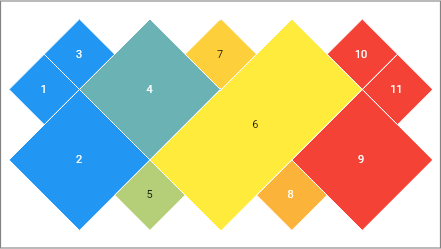
Highlight theme #
Used by addons and cursor hover to highlight layer features on the map.
Color #
MapLayer layer = MapLayer(
dataSource: polygons,
highlightTheme: MapHighlightTheme(color: Colors.green));
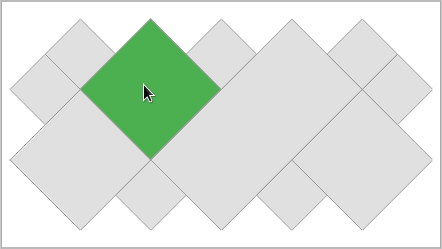
Contour color #
MapLayer layer = MapLayer(
dataSource: polygons,
highlightTheme: MapHighlightTheme(contourColor: Colors.red));
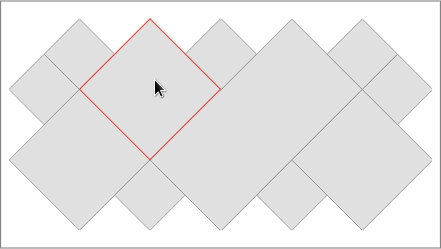
Label #
MapDataSource polygons =
await MapDataSource.geoJson(geoJson: geoJson, labelKey: 'Name');
MapLayer layer = MapLayer(
dataSource: polygons,
highlightTheme: MapHighlightTheme(labelVisibility: (feature) => true));
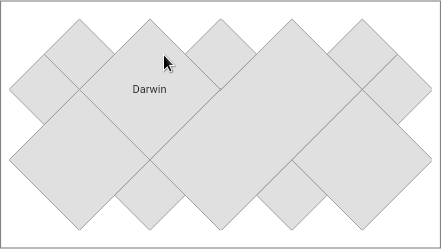
Contour thickness #
VectorMapController _controller = VectorMapController(contourThickness: 3);
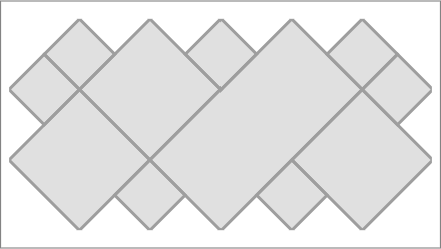
Cursor hover rule #
Enabling hover by property value #
MapDataSource polygons =
await MapDataSource.geoJson(geoJson: geoJson, keys: ['Seq']);
// coloring only the 'Darwin' feature
MapLayer layer = MapLayer(
dataSource: polygons,
theme: MapValueTheme(key: 'Seq', colors: {4: Colors.green}),
highlightTheme: MapHighlightTheme(color: Colors.green[900]!));
// enabling hover only for the 'Darwin' feature
VectorMap map = VectorMap(
controller: _controller,
hoverRule: (feature) {
return feature.getValue('Seq') == 4;
});
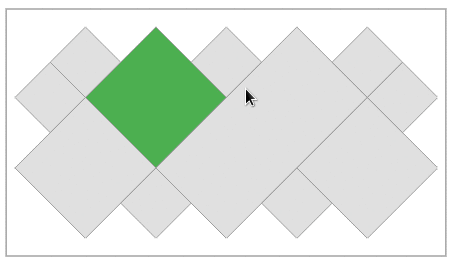
Cursor hover listener #
VectorMap map = VectorMap(
controller: _controller,
hoverListener: (MapFeature? feature) {
if (feature != null) {
int id = feature.id;
}
});
Layers #
MapHighlightTheme highlightTheme = MapHighlightTheme(color: Colors.green);
MapDataSource polygons =
await MapDataSource.geoJson(geoJson: polygonsGeoJson);
MapLayer polygonLayer =
MapLayer(dataSource: polygons, highlightTheme: highlightTheme);
_controller.addLayer(polygonLayer);
MapDataSource points = await MapDataSource.geoJson(geoJson: pointsGeoJson);
MapLayer pointsLayer = MapLayer(
dataSource: points,
theme: MapTheme(color: Colors.black),
highlightTheme: highlightTheme);
_controller.addLayer(pointsLayer);
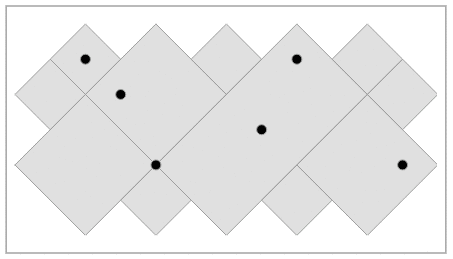
Overlay hover contour #
Allows you to draw the contour over all layers
MapDataSource dataSource1 = MapDataSource.geometries([
MapPolygon.coordinates([2, 3, 4, 5, 6, 3, 4, 1, 2, 3])
]);
MapDataSource dataSource2 = MapDataSource.geometries([
MapPolygon.coordinates([0, 2, 2, 4, 4, 2, 2, 0, 0, 2]),
MapPolygon.coordinates([4, 2, 6, 4, 8, 2, 6, 0, 4, 2])
]);
Overlay disabled:
MapHighlightTheme highlightTheme =
MapHighlightTheme(color: Colors.black, contourColor: Colors.black);
MapLayer layer1 = MapLayer(
dataSource: dataSource1,
theme: MapTheme(color: Colors.yellow, contourColor: Colors.black),
highlightTheme: highlightTheme);
MapLayer layer2 = MapLayer(
dataSource: dataSource2,
theme: MapTheme(color: Colors.green, contourColor: Colors.black),
highlightTheme: highlightTheme);
_controller = VectorMapController(layers: [layer1, layer2]);
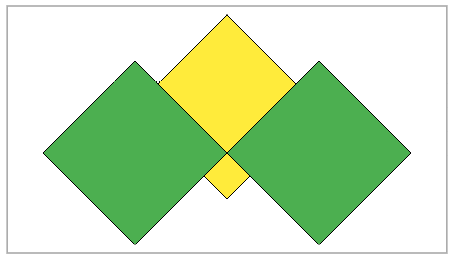
Overlay enabled:
MapLayer layer1 = MapLayer(
dataSource: dataSource1,
theme: MapTheme(color: Colors.yellow, contourColor: Colors.black),
highlightTheme: MapHighlightTheme(
color: Colors.black,
contourColor: Colors.black,
overlayContour: true));
MapLayer layer2 = MapLayer(
dataSource: dataSource2,
theme: MapTheme(color: Colors.green, contourColor: Colors.black),
highlightTheme:
MapHighlightTheme(color: Colors.black, contourColor: Colors.black));
_controller = VectorMapController(layers: [layer1, layer2]);
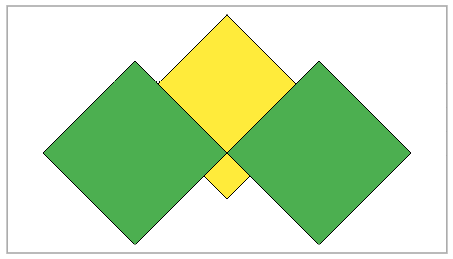
Marker #
Allows different displays for point geometry.
Circle marker #
Default marker.
Fixed radius
Sets a fixed size radius.
MapDataSource polygons =
await MapDataSource.geoJson(geoJson: polygonsGeoJson);
MapLayer polygonsLayer = MapLayer(dataSource: polygons);
_controller.addLayer(polygonsLayer);
MapDataSource points = await MapDataSource.geoJson(
geoJson: pointsGeoJson, keys: ['AN'], labelKey: 'AN');
MapLayer pointsLayer = MapLayer(
dataSource: points,
theme: MapTheme(
color: Colors.black,
markerBuilder: CircleMakerBuilder.fixed(radius: 15)));
_controller.addLayer(pointsLayer);
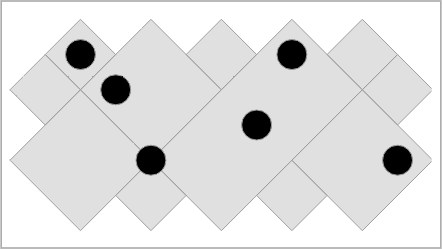
Radius by mapping values
Maps property values to radius values.
MapDataSource polygons =
await MapDataSource.geoJson(geoJson: polygonsGeoJson);
MapLayer polygonsLayer = MapLayer(dataSource: polygons);
_controller.addLayer(polygonsLayer);
MapDataSource points = await MapDataSource.geoJson(
geoJson: pointsGeoJson, keys: ['AN'], labelKey: 'AN');
MapLayer pointsLayer = MapLayer(
dataSource: points,
theme: MapTheme(
color: Colors.black,
labelVisibility: (feature) => true,
markerBuilder: CircleMakerBuilder.map(
key: 'AN', radiuses: {41: 25, 22: 20, 14: 10, 10: 10})));
_controller.addLayer(pointsLayer);
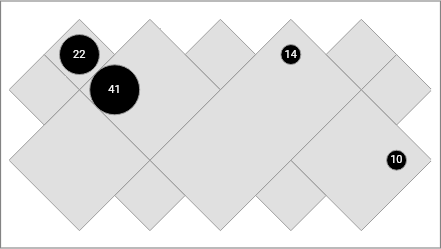
Radius by property values
Uses the property values as radius values.
MapDataSource polygons =
await MapDataSource.geoJson(geoJson: polygonsGeoJson);
MapLayer polygonsLayer = MapLayer(dataSource: polygons);
_controller.addLayer(polygonsLayer);
MapDataSource points = await MapDataSource.geoJson(
geoJson: pointsGeoJson, keys: ['AN'], labelKey: 'AN');
MapLayer pointsLayer = MapLayer(
dataSource: points,
theme: MapTheme(
color: Colors.black,
labelVisibility: (feature) => true,
markerBuilder: CircleMakerBuilder.property(key: 'AN')));
_controller.addLayer(pointsLayer);
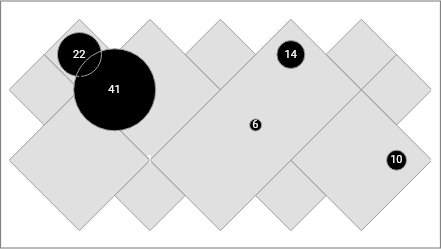
Radius in proportion to property values
MapDataSource polygons =
await MapDataSource.geoJson(geoJson: polygonsGeoJson);
MapLayer polygonsLayer = MapLayer(dataSource: polygons);
_controller.addLayer(polygonsLayer);
MapDataSource points = await MapDataSource.geoJson(
geoJson: pointsGeoJson, keys: ['AN'], labelKey: 'AN');
MapLayer pointsLayer = MapLayer(
dataSource: points,
theme: MapTheme(
color: Colors.black,
labelVisibility: (feature) => true,
markerBuilder: CircleMakerBuilder.proportion(
key: 'AN', minRadius: 8, maxRadius: 30)));
_controller.addLayer(pointsLayer);
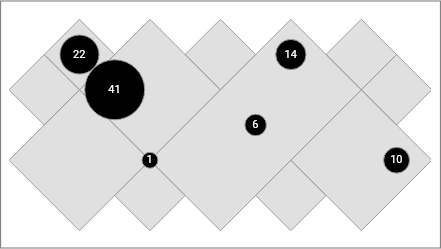
Addons #
Allows adding components on the map.
Legend #
Available customizations:
- padding
- margin
- decoration
Gradient legend
Legend for gradient themes.
MapDataSource polygons = await MapDataSource.geoJson(
geoJson: geoJson, keys: ['Gts'], labelKey: 'Gts');
MapLayer layer = MapLayer(
id: 1,
dataSource: polygons,
theme: MapGradientTheme(
contourColor: Colors.white,
labelVisibility: (feature) => true,
key: 'Gts',
colors: [Colors.blue, Colors.yellow, Colors.red]));
_controller.addLayer(layer);
_addons = [GradientLegend(layer: layer)];
VectorMap map = VectorMap(
controller: _controller,
layersPadding: EdgeInsets.fromLTRB(8, 8, 56, 8),
addons: _addons);
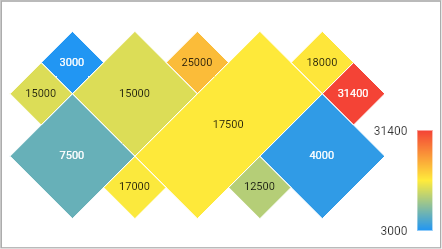
Gradient legend - Setting min and max values
MapLayer layer = MapLayer(
id: 1,
dataSource: polygons,
theme: MapGradientTheme(
contourColor: Colors.white,
labelVisibility: (feature) => true,
key: 'Gts',
min: 7500,
max: 25000,
colors: [Colors.blue, Colors.yellow, Colors.red]));
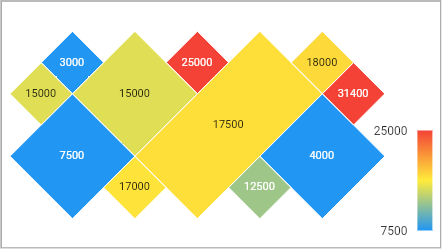
Gradient legend - Highlight
MapLayer layer = MapLayer(
id: 1,
dataSource: polygons,
theme: MapGradientTheme(
contourColor: Colors.white,
labelVisibility: (feature) => true,
key: 'Gts',
min: 7500,
max: 25000,
colors: [Colors.blue, Colors.yellow, Colors.red]),
highlightTheme: MapHighlightTheme(color: Colors.brown[900]));
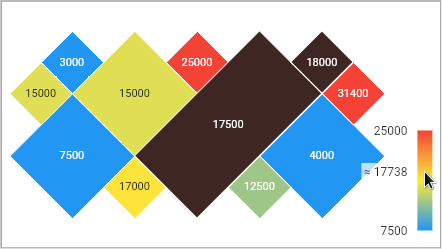
Gradient legend - Customization
Available customizations:
- gradient bar width
- gradient bar height
- gradient bar border
- values font size
- gap between bar and values
MapLayer layer = MapLayer(
id: 1,
dataSource: polygons,
theme: MapGradientTheme(
contourColor: Colors.white,
labelVisibility: (feature) => true,
key: 'Gts',
colors: [Colors.blue, Colors.yellow, Colors.red]));
_addons = [
GradientLegend(
layer: layer,
barBorder: Border.all(width: 2),
barHeight: 50,
barWidth: 30)
];
VectorMap map = VectorMap(
controller: _controller,
layersPadding: EdgeInsets.fromLTRB(8, 8, 56, 8),
addons: _addons);
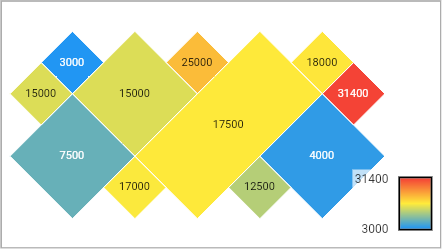
Click listener #
VectorMap map = VectorMap(
controller: _controller,
clickListener: (feature) {
print('feature id: ${feature.id}');
});
Mode #
Auto fit #
This is the default mode
VectorMapController _controller =
VectorMapController(mode: VectorMapMode.autoFit);
Pan and zoom #
VectorMapController _controller =
VectorMapController(mode: VectorMapMode.panAndZoom);
Debugger #
Building a debugger
MapDebugger debugger = MapDebugger();
Binding the debugger on the map
_controller = VectorMapController(debugger: widget.debugger);
Building the debugger widget
MapDebuggerWidget debuggerWidget = MapDebuggerWidget(debugger);
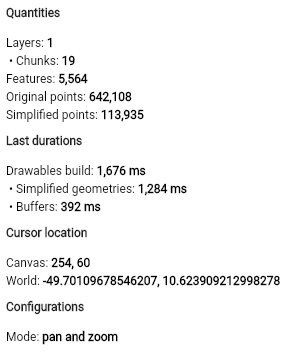
I'm working on #
- More theming features
- More legends
- More gradient legend customizations
- More addons
- Handle line type geometries
- Click and mouse hover (need geometry buffer)
- Improve the performance of heavy geometries (over 500k points) on mobile devices
- Pan limits?
- Release the final version (1.0.0). The API may have some small changes.
Support this project #
Bitcoin #
bc1qhqy84y45gya58gtfkvrvass38k4mcyqnav803h
Ethereum (ERC-20) or Binance Smart Chain (BEP-20) #
0x9eB815FD4c88A53322304143A9Aa8733D3369985



